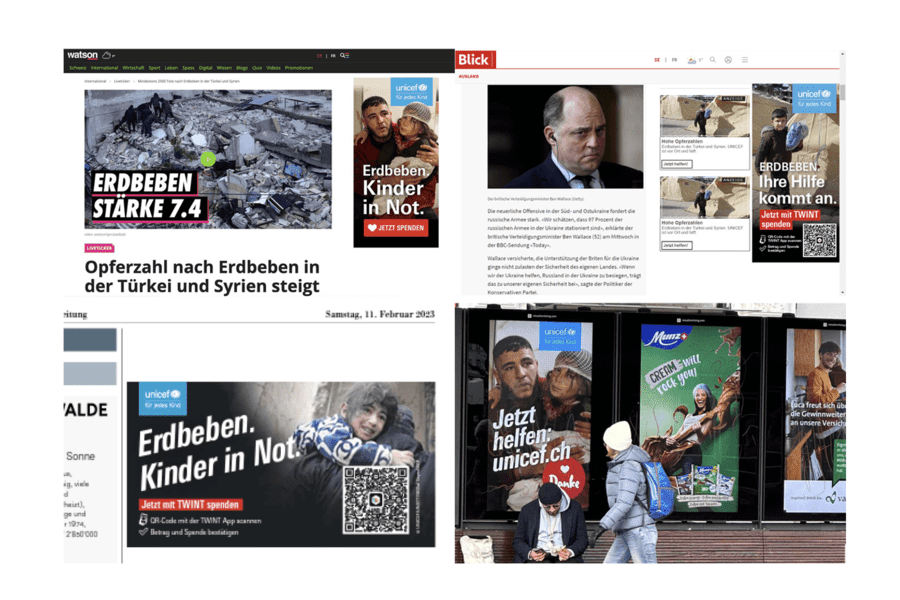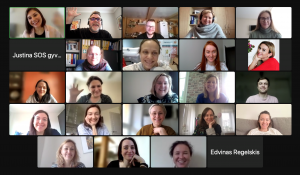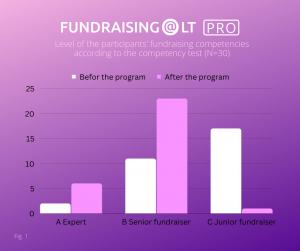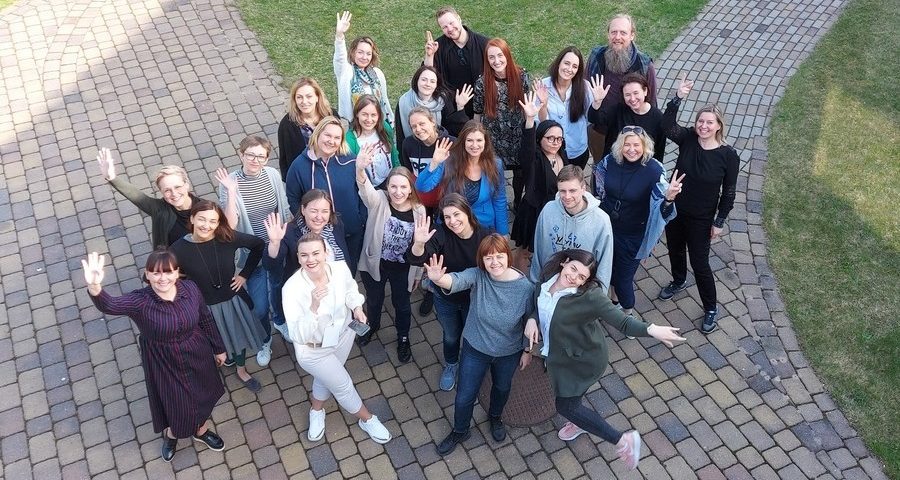
Special focus: What can nonprofits expect from 2023?
January 18, 2023
Felix Freese: In emergencies act fast, talk faster
February 22, 2023With the fundraising sector still in its infancy in Lithuania, so far no training opportunities have been available for fundraisers. Seeking to address this, Giedrė Šopaitė-Šilinskienė, CEO of Lithuanian donation portal Aukok.lt and her colleague Živilė Tumasonė set out to develop a competency development programme for fundraisers – Fundraising.lt PRO. This month, Giedrė discusses how they did it, the results, and their key learnings.
At the beginning of 2019, my colleague Živilė and I realized that what it takes to be a professional and effective fundraiser was still little understood in the Lithuanian NGO sector. The general impression among our peers was that to be a fundraiser simply required being a good person – empathetic, compassionate and sensitive.
But what about professional skills and knowledge?
Fundraising in Lithuania
Until recently, and for a number of reasons, few people in Lithuania have seen fundraising as an occupation. Firstly, the fundraising sector is very young, barely 30 years old, and until now, there has not been a single organisation (higher education institution or competence development centre) to train NGOs in fundraising. The high cost of taking part in international fundraising training programmes has also been a barrier, as has a mindset among NGOs that fundraising is less important than other key processes, such as social programmes.
As a result, all of our fundraisers are self-taught, with most fundraising in Lithuania achieved through a process of trial and error.
The belief that we need to take fundraising more seriously in Lithuania was the starting point for our initiative Fundraising@LT, and the creation of our first competency development programme for fundraisers – Fundraising.lt PRO.
Fundraising@LT PRO
We started this in autumn 2020, working with our partner the Slovak Fundraising Centre, led by Eduard Marček, and supported by the EEA-Norway Grants – Active Citizens Fund.
The idea was to launch and test a programme tailored to the Lithuanian context. Here’s how we created it:
- We explored the EFA Certification Framework and other fundraising competency development programmes.
- We developed a fundraiser’s competency test – a free, online self-evaluation test consisting of 62 questions. After completing it, the person receives a summarised evaluation of his/her fundraising competencies in 5 categories and an overall evaluation on a 4-level scale (“Expert”, “Senior fundraiser”, “Junior fundraiser”, “Learner”).
- We selected 30 participants representing different Lithuanian NGOs to take the test.
- We used the results to identify the areas that most needed improvement. These were individual fundraising, digital fundraising, and fundraising strategy. The higher-scoring areas were related to fundraising ethics and institutional fundraising (grants). Taking into account the most lacking competencies, we developed Fundraising@Lt PRO.
- The programme comprised 4 modules, 11 training sessions, and 1 networking and experience-sharing event.
- Training sessions were prepared and delivered by international fundraising experts E. Marček and K. Bartovičova (Slovakia), S. Scriver (Ireland), P. de Gregorio (UK), J. Gregor and K. Kratochvílová (Czech Republic), K. Kovacsne Beres (Hungary). For more universal topics (e.g. Strategic Planning or Negotiation) – Lithuanian business professionals were invited.

Implementation of the programme
The programme launched in September 2020 and lasted 15 months. The COVID pandemic and travel restrictions forced us to organise hybrid training sessions, both in-person and remote. In total, Fundraising.lt PRO provided 88 hours of training to each participant. Not only did the 30 participants benefit, but also a wider audience of Lithuanian NGOs, as the programme included a Fundraising Day of experience sharing and networking. During this event, PRO participants shared their gained know-how with founders of small, newer NGOs.
At the end of the programme, all participants repeated the competency test.
Results
Overall, participants’ fundraising competencies improved by 22%. At the start, only 2 participants evaluated their competencies as A level (“Expert”) with 11 at B level (“Senior fundraiser”). The main goal of the programme was to reduce the number of those at C level (“Junior fundraiser”) and increase A and B level fundraisers.
competencies as A level (“Expert”) with 11 at B level (“Senior fundraiser”). The main goal of the programme was to reduce the number of those at C level (“Junior fundraiser”) and increase A and B level fundraisers.
This was achieved with, at the end of the programme, 6 participants evaluating themselves as A level and 23 at B level.
The most improved competencies were promoting donors’ loyalty (+59%), the ability to prepare fundraising strategy (+32%), community and events fundraising (+30%).
The main advantages of the programme were identified by participants as an established community of fundraisers and networking opportunities, exceptional international speakers, and high-quality content. At the end of Fundraising.lt PRO, 100% of participants indicated that their fundraising competencies had improved or improved a lot.
What worked
By evaluating the overall effect of the programme from the point of view of both organizers and participants, I would highlight the following:
- Diversity of the group of participants. The involvement of representatives of NGOs from a wide range of fields and of different maturity provided various cases to work with during the training.
- Measuring impact. Evaluating the participants’ knowledge before the programme helped to understand the needs of the group while measuring afterwards using the same tool helped us evaluate its impact.
- Content tailored to the context of the country. Each foreign lecturer was provided with detailed information about the Lithuanian NGO context, the competencies possessed/lacked by the participants and a formulated task.
- Hybrid learning. During the programme, some of the training was organised in a 1 or 2-day in-person format, while some sessions were organised in a 3-4 hour online training. The online training helped to save costs, especially when taught by foreign lecturers. However, the networking and “informal” part of the programme conducted in person was of great benefit in helping to build a professional community.
- Peer-to-peer learning. For the rapidly evolving field of fundraising, it is not only the knowledge of experienced experts that is important, but also peer-to-peer learning. Therefore, the fundraising competency development programme must include a variety of group work formats. Professional relationships established among participants are one of its success factors – peer-to-peer learning continues beyond the programme.
Lessons learned
I made a list of the things I would like to change in the second version of Fundraising@Lt PRO. First, I would shorten its duration – 15 months is too long for the fast-changing world we have nowadays. I consider 5-8 months optimal. Second, a group of 30 people is too large. Although it does not significantly affect the quality of the online sessions, the size of the group is important for classroom work.
Finally, participant engagement and motivation are crucial aspects for success. Even though motivation was one of the most important selection criteria, the long duration of the programme and the free of charge content (it was funded by the EEA-Norway Financial Mechanism, the Active Citizens Fund) resulted in some participants’ passivity. While we must take into account the fact that most Lithuanian NGOs do not yet prioritise investment in the development of their people’s competencies, this mindset must change. NGOs need to start investing in knowledge and skills to raise the professionalism of the whole fundraising sector.
All in all, Fundraising.lt PRO gave me a very important experience and showed me the huge potential of the Lithuanian NGO sector. We have ambitious, mission-driven, and, most importantly, development-minded people. And they deserve the best possible fundraising competency development programmes. EFA Certification is our long-term goal – at the moment the Lithuanian fundraising field is too small for such a wide certification framework to be sustainable (in terms of finance as well as participants) but we are definitely working in that direction.
About Giedrė Šopaitė-Šilinskienė
Giedrė has been working with and within the NGO sector for more than 14 years. For the past 5 years, she has held the role of CEO of Lithuanian donation portal Aukok.lt with the main mission to empower local NGOs to use their potential in digital fundraising. In 2020 she co-created the platform Fundraising.lt – a professional network and competency development programme for fundraisers in Lithuania. Giedrė is a consultant, speaker, trainer, and even sometimes inspirer with a clear vision to help NGOs become the best version of themselves. She can be found on LinkedIn.




